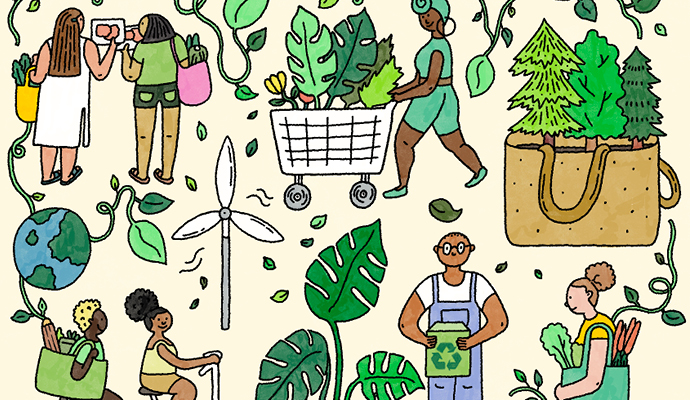The Dawning of a Conscious Consumer
Use your purchasing power for good.
A while back, while shopping for clothes, I almost purchased T-shirts that were (most likely) made by slaves. The only thing that stopped me was remembering this video, which popped up while I was scrolling through my social media newsfeed. The video shifted my self-centered perspective, and I realized that what constitutes a good deal for me is, most likely, a bad deal for someone else.
The T-shirt video was the tipping point of the dawning of my conscious consumerism, which has occurred slowly, but surely, over the past three years. Volunteering with NGOs in developing countries introduced me to the people behind the human trafficking stats. Calculating my slavery footprint challenged my sense of culpability. Watching documentaries such as Food Inc. taught me a lot about supply chains. Discussing the partnership between NoVo Foundation and the Business Alliance for Local Living Economies (BALLE) with NoVo’s co-president Jennifer Buffett made my head hurt as I pondered the implications of her words:
- “We want everything at the lowest cost.”
- “We are living in an exploitative system that is out of balance, and we are not sustaining what sustains us.”
- “We are living in abstractions versus real experiences, with chicken in plastic and tomatoes that don’t taste like tomatoes.”
- “We have commoditized everything, and don’t know where things come from and the people who have produced them.”
“We are living in an exploitative system…and we are not sustaining what sustains us.”
But while I embrace the conscious capitalist ideals, I am not entirely walking my talk. It’s not just what I do at work that matters — it’s also what I do at home. I have been unconsciously consuming products from unconscious capitalists and perpetuating the very practices that I profess to disdain.
Governments, religious leaders, the private sector, and individuals each have an important role in cleaning up supply chains. Take the fight against human trafficking as an example:
- In March 2015, the United Kingdom enacted the Modern Slavery Act 2015, which requires — among other things — that commercial organizations with annual sales above a certain threshold prepare annual statements outlining the steps they have taken to prevent human trafficking.
- In December 2014, leaders from every major faith tradition met and approved a declaration pledging to end modern slavery.
- Private sector companies are mobilizing to educate their employees, define standards, and monitor their suppliers.
- Individuals, in addition to increasing awareness and government advocacy, can influence the companies they patronize to adopt more responsible practices, as well as allocate money and time to support companies and nonprofits committed to fair labor practices.
It’s not easy — I struggled in my quest to become a more conscious consumer. In the process, it became clear that the best way to be a conscious consumer is not to consume at all — go without, wear it out, and buy used. Beyond that, guidance as to whether a product is made with slave labor or is harming the planet is hard to obtain because the sources of information are fragmented and incomplete. To focus my efforts, I decided to concentrate on products and services I used every day, logging my consumption and researching the companies or brands to determine if they are conscious capitalists. If they weren’t, I spent time finding suitable substitutes. Here are the sites that I found most useful:
- The Fair Trade USA and Free2Work websites help determine if the brands you purchase or are considering purchasing are sourced responsibly. Fair Trade USA certifies businesses (allowing them to use the Fair Trade logo on their packaging) that “buy from certified farms and organizations, pay Fair Trade prices and premiums, and submit to rigorous supply chain audits. This process entails a high level of transparency and traceability in their global supply chains.” Whereas businesses apply to Fair Trade for certification, Free2Work “conducts extensive research” to “empower customers with information about the likelihood that products are made with forced or child labor” and assigns grades based on “company efforts in four main categories: policies, monitoring, transparency, and worker rights.” It is this website that directed me from a T-shirt supplier with a grade of D- to one with a grade of A.
- Firms of Endearment is another great source for identifying companies who are “fueled by passion and purpose, not cash” and help “all of their stakeholders thrive: customers, investors, employees, partners, communities, and society.” This site is helpful in that it includes easily accessible information on well-known, large companies.
- Another source for identifying conscious capitalist businesses is B Lab’s B Corp initiative. Companies interested in receiving the B Corp certification must apply and “voluntarily commit to meeting higher standards of transparency, accountability, and performance” by aligning their business practices to a “declaration of interdependence” to operate as a “force for good.” Although there are over 1,300 companies certified, most of them are not household names, making the site a good reference for identifying new suppliers, rather than evaluating your existing ones.
These recommendations are far from exhaustive; they are a result of my earnest, but incomplete, research. I would appreciate hearing from readers who have found reliable sources of information to guide more responsible consumer decisions. Despite the fact that there is no easy, one-stop shop for information related to conscious consumerism, I urge you not to give up — this is another example where perfect is the enemy of good. Get comfortable with your best efforts and take heart knowing that each dollar you spend more consciously makes our world better. With each of us doing our part, businesses will be compelled to reshape their business models in order to survive.



